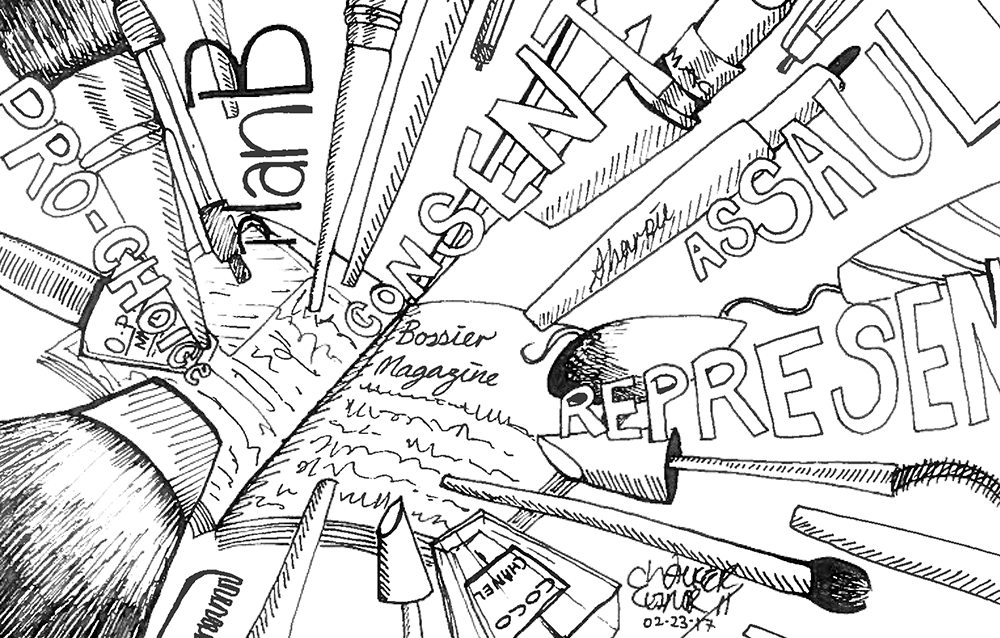High-fashion magazines have long been criticized for promoting unrealistic ideas about beauty, whitewashing and body shaming. This past November, however, they came under fire for a totally different reason: serious journalism.
Teen Vogue’s most-read items of 2016 included both “Donald Trump Is Gaslighting America” and “How to Apply Glitter Nail Polish the Right Way,” sparking a conversation about the role of these women’s magazines in our society. Should you be able to learn how to create a smoky eye in three easy steps and then flip to a piece that follows the protests at Standing Rock Indian Reservation? Should tips for lessening period cramps be in the same magazine that discusses funding for Planned Parenthood? Is there a proper way to mix the personal with the political?
We at Bossier magazine think there is. We founded the magazine this year to promote the work of female authors and artists on campus.
Magazines that exclusively target women are nothing new. The first women’s magazine to gain popularity was The Ladies’ Mercury in Britain in the 17th century. While the circulation of magazines in the 17th century was not nearly as widespread as that of Vogue, much of what we see in women’s magazines today — dating advice, beauty tips and fashion trends — stems from these early magazines that carved out their own space as a publication to discuss what was important to women at the time. Women were not originally included in serious political conversations, so it makes sense that we do not see scathing editorials about prominent leaders in these early magazines.
A lot has changed since then. Women are no longer forced to discuss only makeup, heartbreak and runway trends. But some of us still want to.
Publications like Vogue and Bossier are necessary because they show us what women really are: complex human beings with highly varied interests. Women can be feminine and care deeply about their appearances in a way many men may not. We can date and fall in love and wish for a place to share our feelings. We can also be political, care about the world around us and want to speak out against injustice when we see it. We can have opinions about what affects us directly, such as the economy, national security and, yes, reproductive health care.
We feel passionately about defending women’s magazines as sites of entertainment, vital information and resistance because, for women, the personal has always been deeply political. Even if Cosmopolitan only published information about glitter nail polish, it still merits attention from a variety of angles: the beauty choices that women make, the women-dominated labor industry that serves salons across the country and the implications of different nail colors on the perception of women professionally.
The parts of women’s lives that seem frivolous are actually riddled with politics, so in order to care about current world affairs, we need to not trivialize the platforms that many use to share their opinions and frustrations.
The other day in Chinese class, we compared “forms of media that you learn from” to “trash media.” Quickly, the class categorized Seventeen, Teen Vogue and Cosmopolitan as the latter, and dismissed them as insignificant. At Bossier, we can personally attest that this is untrue, since we have learned an immeasurable amount from creating a women’s magazine at Georgetown.
Our first issue discussed avocado toast, a vacation to Paris and double standards when it comes to finding a boyfriend. In between more lighthearted conversation, our contributors talked about assault, consent, representation and education. As you flip through the pages, it is evident that the personal is political. Our pages are filled with examples of resistance. They push back against every male-dominated sector and every sector that has had a personal impact on our lived experience.
Bossier is no POLITICO, but it is effective for this reason. It is necessary to hear about the world around us from an intimate angle, explore the unglamorous aspects of womanhood and share the art we have created as we react to the changing institutions around us.
So, here’s to discussing voting and velvet trends. Here’s to promoting headlines about both glitter and President Donald Trump. If you believe in feminism, it is time to start paying attention to the female-driven publications that are raising important questions, sharing hidden perspectives and tying it all together with Fashion Week coverage.
Michele Dale and Tiffany Tao are sophomores in the School of Foreign Service. They are co-founders of Bossier magazine.




















